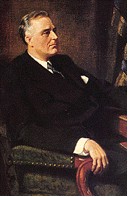|
Moderated by NW Okie! |
Volume 12 , Issue 242010Weekly eZine: (374 subscribers)Subscribe | Unsubscribe Using Desktop... |
An Ordinary Day That Became Extraordinary

The following article was written, submitted by Gene S. Bartlow, MPA, MS, CAE, Colonel, USAF-Retired, Waynoka High School 1958. It also was published originally in the "Waynoka Chronicles," Waynoka Historical Society, Waynoka, Oklahoma, Summer 2007, Vol. 5, No. 2, page 1, 4.
It is very interesting how some events are seared into the memories of young people for life. This is a short story of one of those very special memories. For some unknown reason one of the earliest events of my life growing up in Waynoka, a very small town in Northwest Oklahoma, is burned into my memory as an ordinary day that became quite extraordinary. The day began quite ordinarily; it was springtime in early April, 1945. I was with my mother Mildred Bartlow and my grandmother Minnie Stevens and we were sitting on wooden benches in the relatively small lobby of the AT&SF (Santa Fe) depot waiting for a train to arrive. We were expecting friends, who it was we were to meet I donâ??t remember. At the time I was just 5½ years old and I remember that I was carrying two of my favorite toys, small painted figures of a fireman and a policeman.
This was during World War II when the dreaded news of the death of members of the military was received by telegram from the telegraph office in the Santa Fe depot. A black stripe was taped on the telegram if the news concerned a death.
All of a sudden, without warning, every single person in the crowded waiting room of the Santa Fe depot (including those railroad employees behind the counter) began crying uncontrollably, sobbing with tears all around. As a young five-year-old child I was understandably distraught and joined the crying as if on cue, not knowing or understanding why all the grown ups were all crying. Clearly I had never experienced this phenomenon before (or since), a group of adults beginning to cry simultaneously without warning, and it scared me frightfully.
I inquired as to why everyone was crying. My mother answered through her sobs, â??Gene, the President has diedâ??! This answer had little meaning for me at the time and it was only much later in a high school history class that the significance of that day came clear. As the World War II drew to a close, President Franklin D. Roosevelt's health deteriorated, and on April 12th, 1945, while at Warm Springs, Georgia, he died of a cerebral hemorrhage. Telegrams were sent out to all stations throughout the nation about the news of the Presidentâ??s death, the only President the country had known for over 13 years, since 1932.
Those of us alive at the time all remember where we were on the day President John F. Kennedy was assassinated on November 22nd, 1963, and the day the New York City twin towers came down on 9/11, 2001. I remember where I was on the day FDR died.
| View or Add Comments (1 Comments)
| Receive
updates ( subscribers) |
Unsubscribe
| © . Linda Mcgill Wagner - began © 1999 Contact Me | |
